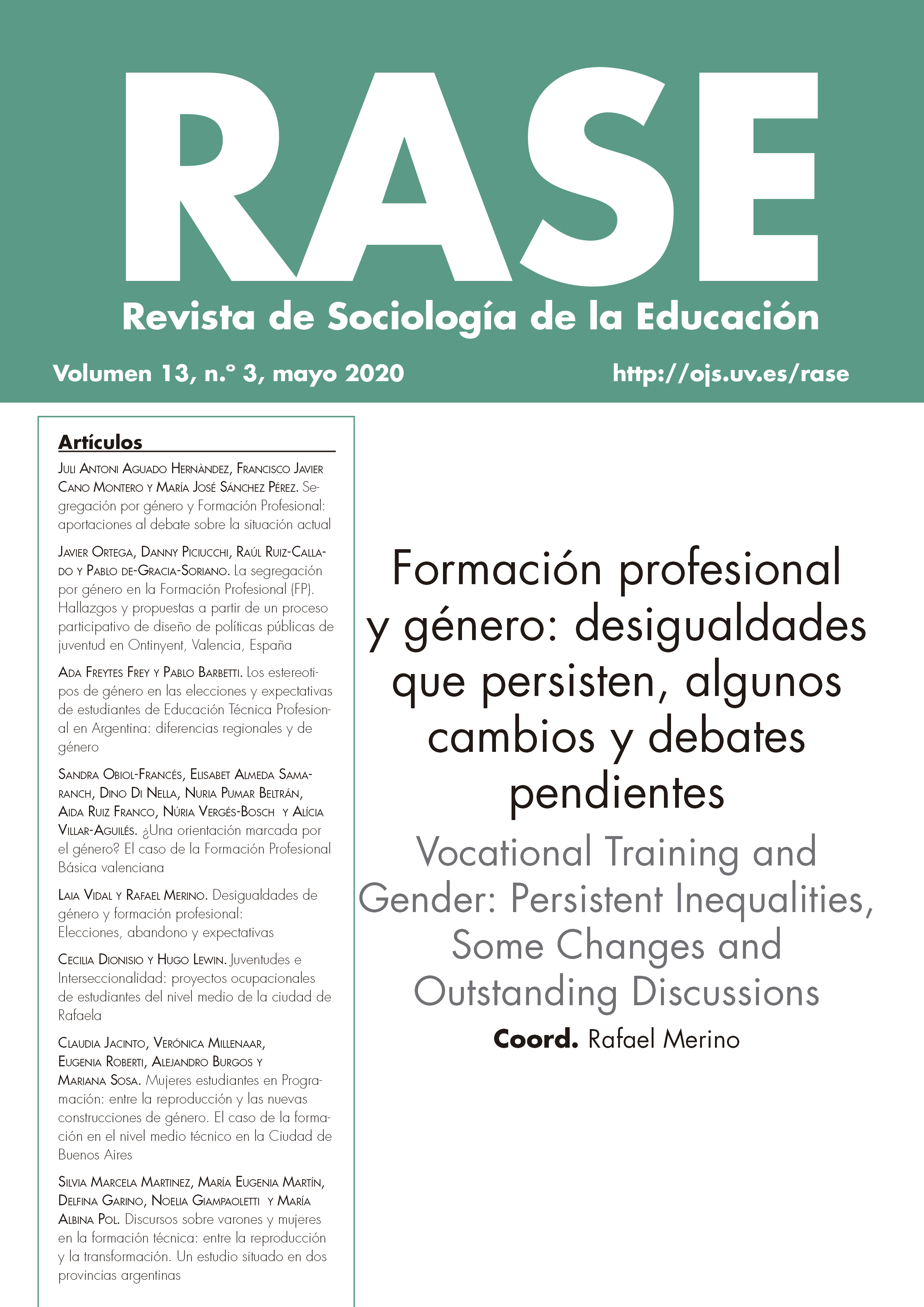Youth and Intersectionality: Occupational Projects of Middle School Students in Rafaela City
DOI:
https://doi.org/10.7203/RASE.13.3.16428Keywords:
Youth, gender, occupational projects Abstract
Abstract
This article presents the preliminary results of the research project: «(IM)PERFECT FUTURE. Perceptions of students of the last year of middle school on professional alternatives and public university education in the city of Rafaela», currently in progress at the National University of Rafaela. The main objective was to investigate the degree of definition of the «Professional Projects» of students close to graduating from secondary schools in Rafaela considering the variables of gender, social class and educational modality. A qualitative meth- odology was adopted, using focus groups and in-depth interviews that showed the links between the subjects and their contexts. For the analysis, the intersectional perspective was considered with the understanding that gender norms are dependent on intersections with racial,class, ethnic, sexual or regional modalities. It was found that the occupational prefigurations of the interviewees are crossed by stereotypes and gender mandates in line with the patriarchal model. At the same time, the socioeconomic level conditioned access to higher education and prefigured occupations. The most impoverished social sectors showed that time is a central resource to think about work and higher education. Finally, we found that women from impoverished social sectors were the group that suffered the most inequities, where the variables of gender and socioeconomic level were combined to restrict their possibilities in higher education and the labour market, leaving them in a situation of greater social vulnerability.
 Downloads
Downloads
 References
References
Añover Lopez, M. (2012): "Los espacios 'del miedo', ciudad y género. Experiencias y percepciones en Zaragoza". Geographicalia, 25-45.
Arango Gaviria, L. (2006). Jóvenes en la universidad. Género, clase e identidad. Colombia: Siglo del Hombre Editores.
Bourdieu, P. (2000). La dominación masculina. Barcelona: Editorial Anagrama.
Bourdieu, P. y Paseron, J.C. (2009). Los herederos Los estudiantes y la cultura. Buenos Aires: Siglo XXI.
Calderon, Y. y Campos Rios, G. (2013): "Las mujeres jóvenes en méxico: ¿estudian o trabajan?". Ultima Década, 63-83. http://dx.doi.org/10.4067/S0718-22362013000200004
D'alessandro, M. (2019). Economía feminista. Las mujeres, el trabajo y el amor. Buenos Aires: Sudamericana.
Duschastzky, S. y Corea, C. (2000). Chicos en banda, los caminos de la subjetividad en el declive de las instituciones. Buenos Aires: Paidós.
Eurydice. (2009). Diferencia de género en los resultados educativos: medidad adoptadas y situación actual en Europa. Madrid: Agencia Ejecutiva en el Ámbito Educativo, Audiovisual y Cultural. https://doi:10.2797/48598.
Expósito, C. (2012): "¿Qué es eso de la interseccionalidad? Aproximación al tratamiento de la diversidad desde la perspectiva de género en España". Investigaciones Feministas, 3, 203-222. https://doi.org/10.5209/rev_INFE.2012.v3.41146
Falu, A. (2014): "El derecho de la mujeres a la ciudad. Espacios públicos sin discriminaciones y violencias". Revista Vivienda y Ciudad, 10-28.
Fernandez Casado, A. (2016): "Coeducación y profesiones masculinizadas. El papel del sistema educativo como agente de socialización". XII Congreso Español de Sociología. Grandes trasnformaciones sociales, nuevos desafíos para la sociología, (págs. 1-29). Gijon.
García Ramírez, C. T. (2016): "Contribuciones de la Teoría Social Feminista y los Estudios de Género a la sociología Venezolana". Revista Espacio Abierto: cuaderno venezolano de socilogía, 47-60.
González, I. (2009): "La orientación académica y profesional en clave de igualdad". Revista Participación educativa., 110-121.
Hochschild, A. (1983). The managed heart: The commercialization of human feelings. Berkeley: California University Press.
Lagarde, M. (2006): "Por la vida y la libertad de las mujeres. Fin al feminicidio". Camara de Diputados LIX Legislatura. Mexico.
Margulis, M. (1996). La juventud es más que una palabra: ensayos sobre cultura y juventud. Buenos Aires: Paidós.
Ortega, F. (1996). Los desertores del futuro. Cordoba: C.E.A.- U.N.C.
Panaia, M. (2013). Abandonar la Universidad con o sin título, 2013. Buenos Aires-Madrid: Miño y Dávila.
Platero, R. (. (2014): "Metáforas y articulaciones para una pedagogía crítica sobre la interseccionalidad". Quaderns de Psicologia, 1(16), 55-72. https://doi.org/10.5565/rev/qpsicologia.1219
Pozzio, M. (2012): "Análisis de género y estudios sobre profesiones: propuestas y desafíos de un diálogo posible -y alentador-". Sudámerica: Revista de ciencias sociales, 1-31.
Subirats, M. (1999): "Género y escuela". En C. Lomas: ¿Igualeso diferentes? Género, diferencia sexual, lenguaje y educación. (págs. 19-32). Buenos Aires: Paidos.
Subirats, M.; Brullet, C. (1988). Rosa y azul. La transmisión de los géneros en la escuela mixta. Madrid: Instituto de la Mujer.
Wyn, L. (2008). Youth and society: Exploring the social dynamics of youth experience. Melbourne: Oxford University Press.
Downloads
Published
How to Cite
-
Abstract982
-
PDF (Español)420
Issue
Section
License
![]()
This work is licensed under a Creative Commons Reconocimiento-NoComercial-CompartirIgual 4.0 Internacional.




